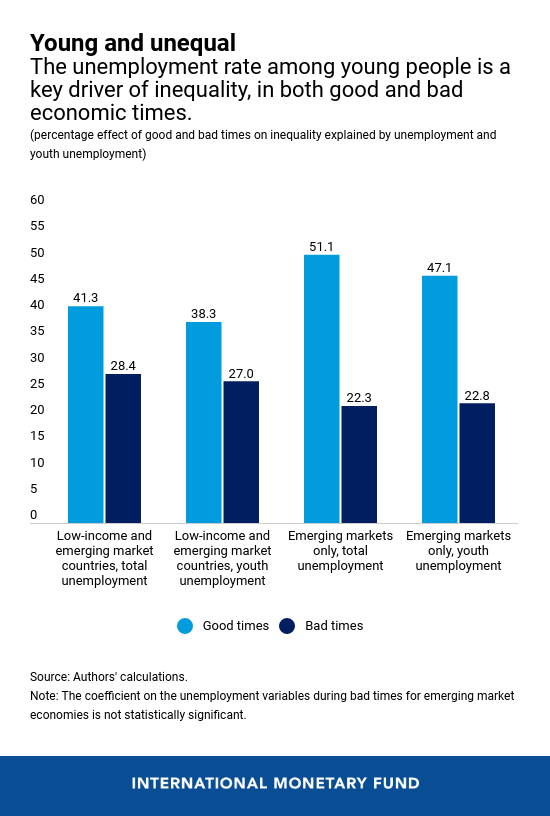Rising economic growth has reduced inequality in low-income and emerging market countries over the years. In good economic times, young people working helps reduce inequality in both groups of countries. But when growth slows down and jobs are lost, more young people out of work in low-income countries leads to a rise in inequality. In emerging markets, the story is a bit different and we’ll explain why.
The results in our coauthored recent paper, which studies a group of 71 low-income and emerging market countries, emphasize the importance of both the quality of jobs created and a country’s policies to support employment, which helps reduce inequality and foster more inclusive growth.
A new way of knowing
The relationship between inequality and long-term growth has been closely studied, but the relationship between short-term fluctuations in growth and inequality—both in good times and in bad times—is a rich mine for more research.
To study this relationship, we decided to use an approach called mediation analysis, most often used in psychology, but rarely used in macroeconomics. The idea is to identify what the driving force is behind why something happens, and how these are connected. Another big advantage is it can help pinpoint how important the different driving forces behind any changes may be.
This matters because if policymakers know more about why something is happening, they can design better policies to tackle it head on.
We defined good times and bad times in a given year using two criteria: first, whether a country’s GDP per capita growth rate was positive or negative, and second the difference between that number and the country’s average GDP per capita growth rate between 1981 and 2014.
In good economic times, young people working helps to reduce inequality.
We looked at the impact of good and bad economic times on inequality through unemployment, access to finance, and government spending. We found that in low-income and emerging market countries, unemployment, especially among young people, is an important driver of inequality during good and bad times.
In good times, reduced unemployment in general explains 41 percent of the reduction in inequality in low-income and emerging market economies. Young people working more explains about over one third of that reduction. In bad times, 28 percent of the increase in inequality is because of an increase in unemployment. The increase in unemployment among young people is a key contributor to the rise in inequality.
However, youth unemployment explains less of the rising inequality in bad times in emerging markets. The results suggest that more jobs are created in good times, and fewer jobs lost in bad times in emerging markets compared to low-income countries. This difference could be due to even higher levels of self-employment and informality in low-income countries.
Policy fix
There are two key policy implications from our findings.
First, the quality of jobs created and policies to support employment are important to reduce inequality in low-income and emerging market countries.
Also, reforms to the structure of a country’s economy to boost productivity and long-term growth should design policies that reduce big differences in the distribution of income.
And, since the bulk of the effect of growth on inequality comes from youth unemployment, governments should design policies to increase the employability of younger workers and reduce their vulnerability to economic downturns.







